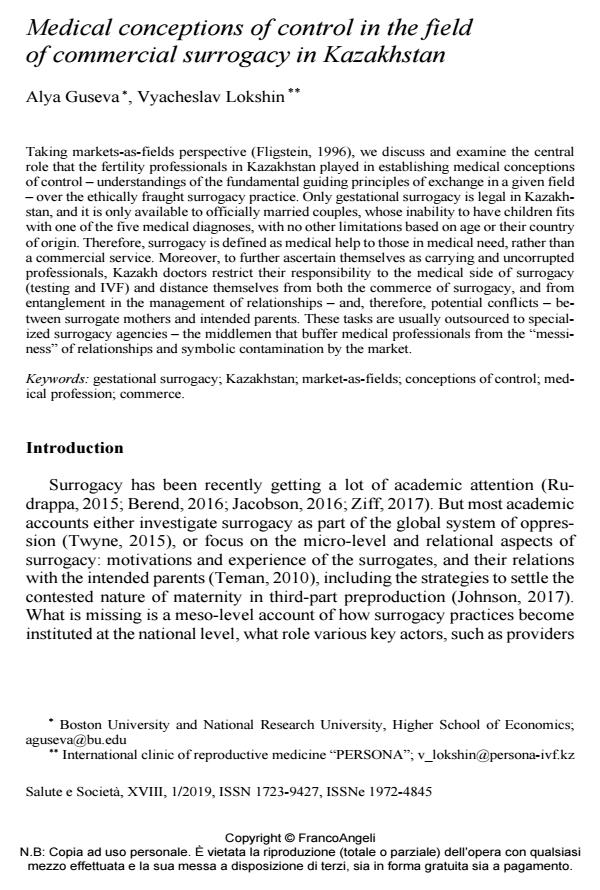Medical conceptions of control in the field of commercial surrogacy in Kazakhstan
Journal title SALUTE E SOCIETÀ
Author/s Alya Guseva, Vyacheslav Lokshin
Publishing Year 2019 Issue 2019/1 Language English
Pages 18 P. 26-43 File size 174 KB
DOI 10.3280/SES2019-001003
DOI is like a bar code for intellectual property: to have more infomation
click here
Below, you can see the article first page
If you want to buy this article in PDF format, you can do it, following the instructions to buy download credits

FrancoAngeli is member of Publishers International Linking Association, Inc (PILA), a not-for-profit association which run the CrossRef service enabling links to and from online scholarly content.
Taking markets-as-fields perspective (Fligstein, 1996), we discuss and examine the central role that the fertility professionals in Kazakhstan played in establishing medical conceptions of control - understandings of the fundamental guiding principles of exchange in a given field - over the ethically fraught surrogacy practice. Only gestational surrogacy is legal in Kazakhstan, and it is only available to officially married couples, whose inability to have children fits with one of the five medical diagnoses, with no other limitations based on age or their country of origin. Therefore, surrogacy is defined as medical help to those in medical need, rather than a commercial service. Moreover, to further ascertain themselves as carrying and uncorrupted professionals, Kazakh doctors restrict their responsibility to the medical side of surrogacy (testing and IVF) and distance themselves from both the commerce of surrogacy, and from entanglement in the management of relationships - and, therefore, potential conflicts - between surrogate mothers and intended parents. These tasks are usually outsourced to specialized surrogacy agencies - the middlemen that buffer medical professionals from the "messiness" of relationships and symbolic contamination by the market.
Keywords: Gestational surrogacy; Kazakhstan; market-as-fields; conceptions of control; medical profession; commerce
- Dzhusubalieva T.M. (2016). Surrogacy in the Republic of Kazakhstan: legal, medical, ethical problems. Reproductive Medicine, 4(29): 60-63. ISSN 2303-9949
- Field M. (1955). Former Soviet citizens’ Aattitudes towards the Soviet, the German and the American medical systems. American Sociological Review 20(6): 674-679. DOI: 10.2307/208867
- Fligstein N. (1996). Markets as politics: A political-cultural approach to market institutions. American Sociological Review, 61,4: 656-673. DOI: 10.2307/209639
- Fligstein N. (2001). Social skill and the theory of fields. Sociological Theory, 19:105-125. DOI: 10.1111/0735-2751.0013
- Fox R.C. (2000). Medical uncertainty revisited. In G. L. Albrecht, R. Fitzpatrick, and S. C. Scrimshaw, a cura di, The Handbook of Social Studies in Health and Medicine. London: Sage Publications.
- Freidson E. (1988[1970]). Profession of Medicine. Chicago: University of Chicago Press.
- Guseva A. (2017). Moralno-eticheskie i yuridicheskie aspekty surrogatnogo materinstva: istoki, mezhdunarodny opyt, problemy (in Russian). Reproductive Medicine, 4(33): 7-11. ISSN 2303-9949
- Jacobson H. (2016). Labor of Love: Gestational Surrogacy and the Work of Making Babies. Rutgers: University Press.
- Johnson K. (2017). Contingent maternalities? Maternal claims-making in third party reproduction. Sociology of Health and Illness, 8: 1349-1364. DOI: 10.1111/1467-9566.1258
- Maguire S., Hardy C., Lawrence T.B. (2004). Institutional entrepreneurship in emerging fields: HIV/AIDS treatment advocacy in Canada. Academy of Management Journal, 47: 657-679. DOI: 10.2307/2015961
- Rona-Tas A., A. Guseva. (2014). Plastic Money: Constructing Markets for Credit Cards in Eight Postcommunist Countries. Stanford: Stanford University Press.
- Rudrappa S. (2015). Discounted Life: The Price of Global Surrogacy in India. New York: NYU Press.
- Starr P. (1982). The Social Transformation of American Medicine. New York: Basic Books.
- Teman E. (2010). Birthing a Mother: The Surrogate Body and the Pregnant Self. Los Angeles: University of California Press.
- Twine F.W. (2015). Outsourcing the Womb: Race, Class and Gestational Surrogacy in a Global Market, 2nd Edition. New York: Routledge.
- Ziff E. (2017). ‘The mommy deployment’: Military spouses and surrogacy in the United States. Sociological Forum, 32(2): 406-425.
- Corbin J, Strauss A. (2014). Basics of qualitative research: Techniques and procedures for developing grounded theory. 4th ed.. New York: Sage.
- Charmaz K. (2014). Constructing grounded theory. 2nd ed. New York: Sage.
- Berend Z. (2016). The Online World of Surrogacy. New York: Berghahn.
- Beckert J. (2010). How do fields change? The interrelations of institutions, networks, and cognition in the dynamics of market. Organization Studies, 31, 5: 605–627. DOI 10.1177/0170840610372184
- Reprowebs: a conceptual approach to elasticity and change in the global assisted reproduction industry Anika König, Heather Jacobson, in BioSocieties /2023 pp.174
DOI: 10.1057/s41292-021-00260-6 - Surrogacy in the Republic of Kazakhstan: A theoretical and legal perspective on legislative regulation improvements Madina Seidinova, Gulzhazira Ilyassova, in RIVISTA DI STUDI SULLA SOSTENIBILITA' 1/2023 pp.109
DOI: 10.3280/RISS2023-001006 - Infrastructure, Morality, Food and Clothing, and New Developments in Latin America Olga Doletskaya, Maria Denisova, Oksana Dorofeeva, pp.33 (ISBN:978-1-80117-435-0)
- GAMETE DONATION. ETHICAL AND LEGAL ASPECTS L. Chalova, V. Lokshin, A. Guseva, A. Kinzhibayev, in Reproductive Medicine /2020 pp.13
DOI: 10.37800/RM2020-1-21 - Sociological Debates on Gestational Surrogacy Daniela Bandelli, pp.17 (ISBN:978-3-030-80301-8)
Alya Guseva, Vyacheslav Lokshin, Medical conceptions of control in the field of commercial surrogacy in Kazakhstan in "SALUTE E SOCIETÀ" 1/2019, pp 26-43, DOI: 10.3280/SES2019-001003